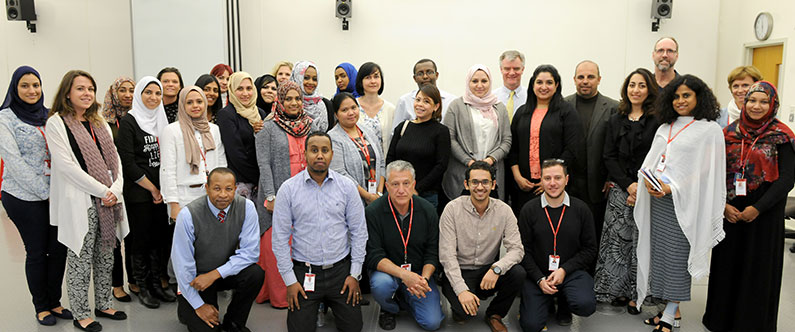First aid training for college staff
 In all, 29 staff members completed the program, which teaches basic life support and how to use an automated external defibrillator.
In all, 29 staff members completed the program, which teaches basic life support and how to use an automated external defibrillator.
Staff and faculty at WCM-Q learned a variety of lifesaving skills when the Hamad International Training Center (HITC) visited the college to deliver a two-day instructional program.
Sponsored by WCM-Q’s Division of Environmental Health and Safety (EHS), the program consisted of eight hours of theoretical and practical instruction in essential techniques such as how to administer cardiopulmonary resuscitation (CPR) and how to use an automated external defibrillator.
The program marked the first time that HITC, which is a part of Hamad Medical Corporation, has visited WCM-Q to deliver this training and the response from staff and faculty was enthusiastic. In total, 29 WCM-Q staff completed the program, the full name of which is the Basic Life Support (BLS)/Automated External Defibrillator (AED) and First Aid Provider Course, said Tom Doyle, WCM-Q’s director of environmental health, safety, and security.
“We are very fortunate that we have lots of highly trained physicians at the college who can help out if there is an emergency, but there are times when they are not around so it is important for as many staff as possible to receive training in these lifesaving techniques,”
he said.
“We are extremely grateful to the Hamad International Training Center for coming to WCM-Q to deliver this essential training, and I am very pleased that so many of our staff participated.
When you consider that the chances of survival of someone who suffers a sudden cardiac arrest decreases seven to 10 percent every minute that they do not receive defibrillation, you realize that knowing these techniques can be the difference between life and death for someone in the unlikely event of an accident or emergency.”
The participants learned the theory behind the techniques before trying them out in a practical session using medical manikins. It is hoped that the program, which HITC provides in accordance with the guidelines of the European Resuscitation Council, will become a regular event at WCM-Q.
“This training is extremely beneficial and we would like to train as many WCM-Q staff as we can,”
added Tom.
“QF is planning to install mobile defibrillator units at strategic points around the college so it is important that people know how to use them correctly.”
Deema Al-Sheikhly, director of continuing professional development at WCM-Q, was one of the staff members who completed the course. She said:
“These are really important and useful skills to know, not just for the workplace but for your personal life. Not only did we learn techniques that could save someone’s life but we were also able to eliminate some myths and discover what not to do, which in some ways is just as important.
In my opinion, these skills are extremely necessary and important for everyone to know.”